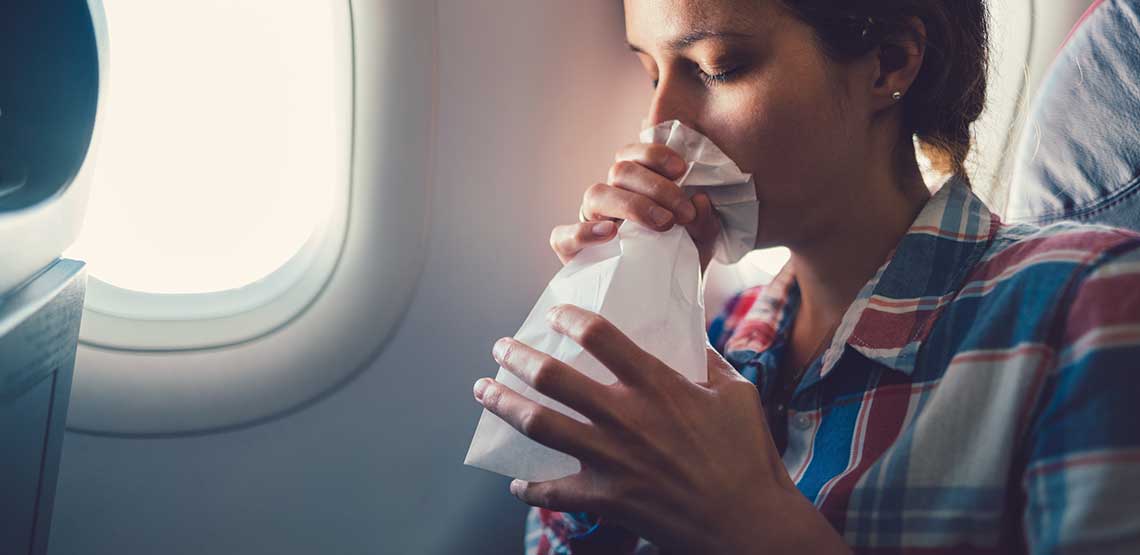How to Treat Nausea
There are undoubtedly very few sensations more unpleasant than experiencing nausea. Whether it’s a mild sensation or severe, nausea generally makes a person feel like they’re going to vomit. The good news is that, although nausea often resolves itself with a bit of time, there are also many strategies for how to treat nausea to relieve the unpleasant symptoms.
The Basics of Nausea
Nausea can occur for a host of reasons and can be mild or severe. Nausea is often a symptom that accompanies sicknesses such as influenza, or it can happen as a side effect to medications or food poisoning.
Various treatment options do exist for nausea, although many cases of nausea are caused by specific situations and therefore resolve on their own.
Nausea sometimes exists without any other symptoms, but often can be accompanied by dizziness, excessive sweating, a cold “clammy” feeling in the body, diarrhea, stomach pains and cramping, or fever, depending on the underlying cause of the nausea.
What Causes Nausea?
Nausea most often leads to dry heaving or vomiting, although it can exist on its own and not result in the person actually throwing up.
Here are some of the many conditions that can cause nausea:
- Pregnancy (morning sickness)
- Food poisoning (nausea after eating)
- Medication side effects
- Emotional distress
- Unpleasant odors
- Motion sickness or dizziness
- Ingestion of chemicals or toxins
- Some types of cancer
- Change in altitude
- Ulcers
- Trauma such as concussions
- Stomach flu or other infections
- Overconsumption of alcohol
How Long Does It Last?
Sometimes it is clear what the cause of the nausea was, such as immediately following a meal, after extreme distress, riding a roller coaster, or even taking a new medication. Sometimes though, nausea can seemingly emerge out of nowhere and its cause is harder to trace. In some cases, the nausea will be immediately resolved once vomiting occurs. Other times, it can drag on for longer and be harder to control.
Nausea also differs somewhat depending on age, as food-related or allergy-related nausea and vomiting is more common in young children.
Nausea Treatment
Treatment for nausea is not always required, such as in cases where it’s clear what the cause is — acute food poisoning or overconsumption of alcohol for example. In these cases, immediately after vomiting the symptoms typically dissipate.
In more chronic or severe cases though, it may be appropriate and needed to seek out treatment options.
Related Search Topics (Ads)
Drink Water and Eat Plain Food
In almost any case, those suffering from nausea would do well to hydrate with plenty of clear fluids like water, and avoid any potentially irritating or spicy foods — sticking to basics like white rice and dry toast.
The Risk of Dehydration
Speaking of hydration, if your nausea leads to vomiting that continues for repeat sessions, you may become at risk for dehydration as fluids are lost. It’s extremely important to rehydrate the body. Sports drinks with electrolytes are useful, and in ongoing or more extreme cases, hospitalization may be required to receive IV fluids. Increased thirst, dry or cracking lips, and increased pulse and breathing rate are all warning signs of dehydration in adults and children. Children especially tend to be at greater risk since they can’t articulate their symptoms as well.
Natural Remedies for Nausea
When it comes to how to treat nausea, natural remedies can also ease nausea in acute, milder cases. Peppermint tea is a known stomach-soother, as is ginger, which can be easily enjoyed in chews or by using the root in tea.
OTC and Prescription Anti-Nausea Medications
Over the counter remedies may be needed and are helpful in some cases. Anti-nausea medications can be found in pharmacies or be prescribed by your health care provider when needed. In some cases, anti-nausea medications may be prescribed preventatively such as in following a surgery where anesthesia is used, which can cause nausea and vomiting. Another example of when preventative medicine may be helpful is if you are going to be on a ship and know you experience seasickness. There are many over the counter and prescription anti-nausea medications available for these cases, so speak with your healthcare provider about how to treat your nausea.
Most Cases Will Resolve Themselves
Most cases of nausea tend to be short-lived and will resolve on their own. If you’ve experienced an altitude change, eaten something that didn’t agree with you, overindulged in alcohol, or gotten car or motion sickness for example, the nausea will resolve itself when the cause is removed or in the case of food poisoning, after vomiting up the offending food.
When to See a Doctor
However, if there’s no obvious and mild cause for your nausea (such as motion sickness or food poisoning that passes quickly) it may be time to call your healthcare provider. In particular, if the nausea persists for more than a day or so it could be indicative of something more severe or a sign that something else is going on in the body.
Though many instances of nausea one will experience in their lifetime are acute and harmless, nausea and vomiting can also be associated with potentially life-threatening conditions such as heart attack, stroke or traumatic brain injury. If your nausea is sudden and associated with any of the other signs of serious conditions, seek immediate medical attention.
A potential danger of nausea leading to vomiting is dehydration, so if any signs of dehydration emerge, it’s always best to consult your doctor to get an examination and treatment.


